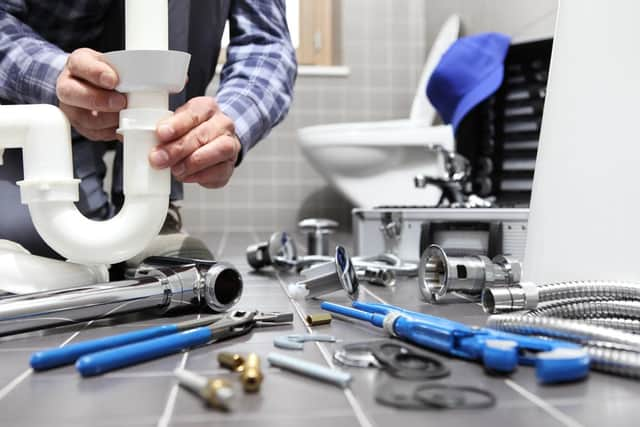Can tradesmen still work? whether plumbers, electricians and other tradesmen can still work amid coronavirus lockdown
and live on Freeview channel 276
One such exception was that members of the public were still allowed to leave their house to travel to and from work, but only “where this is absolutely necessary and cannot be done from home”.
Last week the government announced the closure of schools to all pupils with the exceptions of children of “key workers”.
Advertisement
Hide AdAdvertisement
Hide AdThese key workers will continue to be allowed to attend work under lockdown rules, though should work from home if possible.


According to the government’s website, workers in “the oil, gas, electricity and water sectors” are classed as key workers.
This rule also applies to key staff working in civil nuclear, chemicals, and telecommunication too.
The government’s advice to workers who think they fall within these categories is to “confirm with their employer that, based on their business continuity arrangements, their specific role is necessary for the continuation of this essential public service.”
Advertisement
Hide AdAdvertisement
Hide AdThe Scottish government has ordered all building sites to close across the country.
The First Minister said: “Our advice right now is that we would expect construction sites to be closed unless the building that is being worked on is essential such as a hospital."
And she confirmed that it is the responsibility of employers to protect the health of their employees.
The decision comes as the Westminster government said builders and labourers were still allowed to work on building sites as long as they followed social distancing measures.
Advertisement
Hide AdAdvertisement
Hide AdOn Monday, the housing and communities minister, Robert Jenrick said that the advice for the construction industry was that “if you are working on site, you can continue to do so.”
Despite this reassurance, some major firms, like Persimmon and Bellway, have decided to halt all construction work except for essential tasks.
Coronavirus: the facts
What is coronavirus?
COVID-19 is a respiratory illness that can affect lungs and airways. It is caused by a virus called coronavirus.
What caused coronavirus?
The outbreak started in Wuhan in China in December 2019 and it is thought that the virus, like others of its kind, has come from animals.
How is it spread?
Advertisement
Hide AdAdvertisement
Hide AdAs this is such a new illness, experts still aren’t sure how it is spread. But, similar viruses are spread in cough droplets. Therefore, covering your nose and mouth when sneezing and coughing, and disposing of used tissues straight away is advised. Viruses like coronavirus cannot live outside the body for very long.
What are the symptoms?
The NHS states that the symptoms are: a dry cough, high temperature and shortness of breath - but these symptoms do not necessarily mean you have the illness. Look out for flu-like symptoms, such as aches and pains, nasal congestion, runny nose and a sore throat. It’s important to remember that some people may become infected but won’t develop any symptoms or feel unwell.
What precautions can be taken?
Washing your hands with soap and water thoroughly. The NHS also advises to cover your mouth and nose with a tissue or your sleeve (not your hands) when you cough or sneeze; put used tissues in the bin immediately and try to avoid close contact with people who are unwell. Also avoiding touching eyes, nose and mouth unless your hands are clean.
Government advice
As of Monday 23 March the prime minister has put the UK into lockdown and instructed all citizens to stay at home. People can only leave their homes to exercise once a day, go shopping for food and medication, travel for medical needs or to care for a vulnerable person, and travel to work only if essential. Police will be able to enforce these restrictions.
Advertisement
Hide AdAdvertisement
Hide AdAll non-essential shops will close with immediate effect, as will playgrounds, places of worship and libraries. Large events or gatherings of more than two people cannot go ahead, including weddings and celebrations. Funerals can only be attended by immediate family.
Children of separated parents can go between both parents' homes.
Anyone with a cough or cold symptoms needs to self-isolate with their entire household for 14 days.
The government has now instructed bars, restaurants, theatres and non-essential businesses to close and will review on a ‘month to month’ basis. Schools closed from Friday 20 March for the foreseeable future, and exams have been cancelled.
Advertisement
Hide AdAdvertisement
Hide AdThe over 70s or anyone who is vulnerable or living with an underlying illness are being asked to be extra careful and stay at home to self-isolate. People with serious underlying health conditions will be contacted and strongly advised to undertake "shielding" for 12 weeks.
For more information on government advice, please check their website.
Should I avoid public places?
You should now avoid public places and any non-essential travel. Travel abroad is also being advised against for the next 30 days at least, and many European countries have closed their borders.
What should I do if I feel unwell?
Don’t go to your GP but instead call NHS 111 or look online at the coronavirus service that can tell you if you need medical help and what to do next.
When to call NHS 111
Advertisement
Hide AdAdvertisement
Hide AdNHS 111 should be used if you feel unwell with coronavirus symptoms, have been in a country with a high risk of coronavirus in the last 14 days or if you have been in close contact with someone with the virus.
Sources: World Health Organisation and NHS